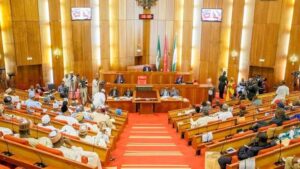Senator Opeyemi Bamidele, the Leader of the Senate and Chairman of the investigative Ad-hoc committee on alleged economic sabotage in the petroleum sector, has announced that the investigation initially launched by separate committees in both the Senate and the House of Representatives will now be handled jointly. This decision comes as the National Assembly returns to full parliamentary sessions and seeks to address the long-standing issues plaguing Nigeria’s petroleum industry.
In a statement personally signed by Senator Bamidele on Monday, he emphasized the National Assembly’s commitment to resolving the challenges within the sector. According to him, both chambers will revisit their initial decision and take decisive action to investigate and resolve the inefficiencies that have crippled the petroleum industry. The statement highlighted critical issues such as crude oil theft, the persistent failure of turnaround maintenance of public refineries, the importation of substandard petroleum products, and the overall disruption of fuel supply in the country.
Senator Bamidele’s remarks are particularly timely given the ongoing concerns over the underperformance of Nigeria’s petroleum sector, which has long been seen as the backbone of the nation’s economy. He noted that these problems are contributing to the sector’s inability to operate at its full potential, resulting in significant economic losses for the country. The senator was quick to clarify that despite some media reports, the Senate had not suspended its investigation into alleged economic sabotage. Instead, the public hearing scheduled by the Senate Ad-hoc committee was postponed to address some internal issues related to the Rules of the National Assembly.
 Senator Bamidele explained that both chambers of the National Assembly are now working to resolve these procedural issues and will likely constitute a joint committee to continue the investigation. This joint committee will pick up where the previous Ad-hoc committee left off, with the goal of uncovering the root causes of economic sabotage in the petroleum industry. The investigation will also focus on developing institutional mechanisms that will ensure the industry operates more efficiently and contributes more effectively to Nigeria’s economic growth.
Senator Bamidele explained that both chambers of the National Assembly are now working to resolve these procedural issues and will likely constitute a joint committee to continue the investigation. This joint committee will pick up where the previous Ad-hoc committee left off, with the goal of uncovering the root causes of economic sabotage in the petroleum industry. The investigation will also focus on developing institutional mechanisms that will ensure the industry operates more efficiently and contributes more effectively to Nigeria’s economic growth.
The senator underscored the importance of this investigation, noting that it is being conducted in the national interest. The inefficiencies within the petroleum sector, including crude oil theft and the questionable management of Nigeria’s refineries, have long been a source of frustration for both lawmakers and citizens alike. By addressing these issues, the National Assembly hopes to bring about meaningful reforms that will restore the petroleum industry to a position of strength and reliability.
In addition to the investigation, Senator Bamidele mentioned other legislative priorities on the horizon for the National Assembly. One key area of focus is the consideration of the Medium Term Expenditure Framework (MTEF) and Fiscal Strategy Paper (FSP), both of which are essential components of the annual budget preparation process. He noted that the National Assembly is expecting to receive the new MTEF and FSP from the executive branch in the coming weeks. These documents will play a crucial role in shaping the 2025 Appropriation Bill, which must be prepared, considered, and approved by the National Assembly before the end of the year.
The senator emphasized the importance of the MTEF and FSP in the overall budget process, stating that the timely consideration of these documents is a top priority on the legislative agenda. Without the MTEF and FSP, the 2025 Appropriation Bill cannot be laid before the National Assembly, and the entire budget process could be delayed. Therefore, lawmakers are keen to ensure that these documents are carefully reviewed and approved in a timely manner to prevent any disruptions to the budget process.
Beyond budgetary matters, Senator Bamidele also highlighted another significant undertaking for the Senate – the ongoing review of the 1999 Constitution. The Constitution Review Committee, which is chaired by the Deputy President of the Senate, Senator Barau Jibrin, is expected to begin holding retreats and strategy sessions in the coming weeks. These sessions will allow committee members to delve into key sections of the constitution that may require amendment.
The senator explained that the review process will be comprehensive and inclusive, with the committee calling for memoranda from various stakeholders and organizing zonal meetings across the country. These zonal meetings will give citizens and interest groups the opportunity to share their views on the proposed amendments and contribute to shaping the future of Nigeria’s governance structure.
Senator Bamidele expressed confidence in the ability of the Constitution Review Committee to carry out its task, pointing to the pedigrees of its members as evidence of the committee’s capability. He emphasized that the committee’s work would adopt a truly federative approach, ensuring that any amendments to the constitution reflect the needs and aspirations of the Nigerian people. The ultimate goal of the review is to redefine and reinvent public governance in Nigeria, making it more responsive, efficient, and aligned with the principles of federalism.
In conclusion, Senator Bamidele’s statement offers a glimpse into the key priorities for the National Assembly as it resumes its full parliamentary sessions. The joint investigation into the petroleum sector, the consideration of the MTEF and FSP, and the review of the 1999 Constitution all signal the Senate’s commitment to addressing the most pressing issues facing the country. As lawmakers continue to tackle these challenges, Nigerians can expect a more focused and collaborative effort to bring about meaningful reforms that will benefit the entire nation.




